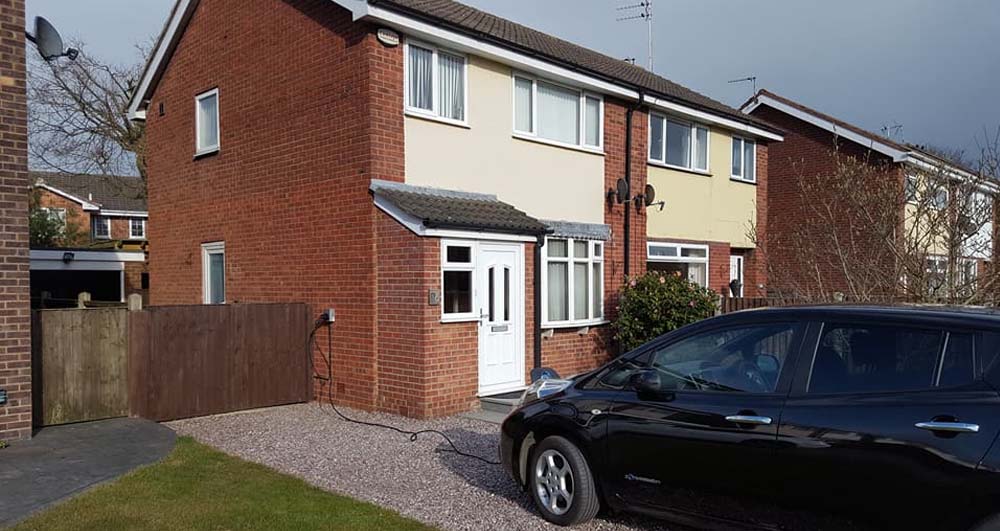The market for electric vehicles is growing rapidly which is leading to an increasing demand for home EV chargers too. Adding fuel to the fire, at the end of 2020 the UK Government announced a ban on new petrol and diesel cars from 2030 – a strong statement towards the health of our environment and further enhancing the switch to electric vehicles.
If you’re considering an electric car or have one already, you’ll have thought about charging your car at home. It’s important to know a bit about EV chargers and their installation, and you might even be eligible for a grant to help with the costs.
Keep reading to find out the answers to some of the most frequently asked questions when it comes to electric car charging at home.
How do I charge my electric car at home?
There are two options for charging your car at home. You can either plug it directly into your mains supply with a three-pin plug (level 1 charger) or install a dedicated EV charge point (level 2).
Level 1 charging is slow; using the mains can take anything from 8 – 14 hours to fully charge an average electrical vehicle. Although they all come with a standard charging cable and a three-pin plug, most car manufacturers advise against using this in the long term.
A level 2, dedicated EV charge point is much more efficient; it charges a vehicle in around 4 – 12 hours. Plus, if you’re a UK resident you can also receive an OLEV government grant that contributes to the cost of EV charger installation.
In the long term, having a dedicated charge point for your car is very low maintenance and much better than trailing a standard power cable from your house out into your drive or the street! Read our full blog on charging an EV.
What is the OLEV grant?
The OLEV (Office for Low Emission Vehicles) grant, now known as OZEV (Office for Zero Emission Vehicles) grant will cover up to 75% of the costs of buying and installing a home EV charge point, to a maximum of £350 inc VAT.
If you meet the eligibility criteria, the grant is paid directly to your installer who will adjust your bill. Read more about the grant here.
How do I know if I’m eligible?
There are a few straightforward criteria to meet. They include; proving your ownership of the car (leasing is also included), ensuring the model of car is on the list of approved vehicles, having access to off street parking and being a resident at the home where you plan to install the charger.
To find out more about your eligibility, read this Gov UK site or our simplified guide.
What should I consider when buying an EV charger?
EV charger considerations usually depend on your model of car and your home electricity setup.
Firstly, check which cables and connectors your vehicle uses – most new EVs have type 2 plugs and cables.
What about the speed of charging? As you can imagine, the faster the EV point charges, the higher the cost of the charging device.
Choose between tethered and untethered points. Tethered points have a cable attached which you plug into the car, the latter allows you to use your own cable.
No matter which you choose, we advise working with an electrician to ensure that your home voltage is assessed and installation is done safely. Read more about choosing an EV charger here.
If you don’t have your own driveaway, a solution for you would be to approach your local authority and ask them to install an on-street EV charge point instead.
How much does it cost to charge my electric car at home?
The cost of charging your car at home will depend on your energy tariff, although typically overnight charging is the most cost-efficient option. Don’t panic though, it’s not a complicated formula.
Cost = Size of battery (kWh) x Electricity cost of your supplier (pence per kilowatt hour)
Let’s use the Nissan Leaf with a 40kWh battery as an straightforward example, using the average domestic electricity rate of 14p per kWh to fully charge the battery:
Home charging: 40 (kWh) x 14p = £5.60
Rapid charging: 40 (kWh) x 30p = £12
Using rapid charge points at service stations or elsewhere can be much more expensive, that’s why it’s cheaper and more efficient in the long run to invest in a home charging point! Find out how far your car can travel with a full battery.
What about safety?
Given we are talking about electrics, safety is an important consideration. As mentioned, using your standard three-pin plugs isn’t ideal, although many EV owners are still doing this!
According to a survey by Electrical Safety First respondents admitted to using standard home extension leads to reach their electric cars in the street, sometimes even ‘daisy chaining’ two leads or leaving them out in the rain which creates a huge risk of fire!
The team at Applegarth can install your charging points safely so you don’t have to worry about any risks or issues – much better than risking a hazard in your street!
I’m ready, what’s next?
Applegarth specialises in renewable energy solution installations for residential and commercial properties. We are an OLEV-approved charge point installer, which allows us to provide you with expert OLEV application support.
Our team of fully trained electrical engineers have been helping homeowners and businesses through every stage of their EV charge point installations and electrical design for almost a decade. We provide a comprehensive service, and work with many popular EV charge point manufacturers.
If you are interested in having an EV Charge Point installed or have any questions, then please call us on 0151 649 8350. You can also email us at info@applegarth.co.uk and a member of our team will get back to you as soon as possible. If you would like to apply for the OLEV grant you can do so by using our OLEV application form.







